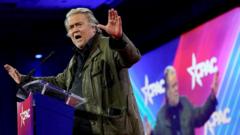Amidst rising expectations for the newly elected Pope Leo XIV, MAGA supporters voice their concerns over his apparent liberal inclinations and possible tensions with President Trump, emphasizing the need for clarity on his political beliefs and actions.
Following the election of Pope Leo XIV, born Robert Francis Prevost in Chicago, a significant faction of Trump's MAGA movement registered their disappointment, concluding that the first American Pope may not align with their "America first" ideologies.
Steve Bannon, a former White House official and key figure in Trump's circle, foresees friction between the Pope and the President, particularly noting Leo’s critiques of U.S. immigration policies on social media. Bannon expressed astonishment that the new Pope has engaged openly against American politicians.
There's limited clarity on Pope Leo’s political orientations; however, he has traditionally expressed concern for the poor and immigrants and appears to align more closely with the liberal-leaning views of his predecessor, Pope Francis. While President Trump lauded the Pope’s election as a considerable honor for the United States, MAGA supporters were less enthused, viewing Leo as a potential opponent of Trump's governance.
John Prevost, the Pope's brother, indicated that Leo would likely voice disagreements with the President, particularly on immigration issues. Recent surveys highlight a complex landscape within U.S. Catholicism, where while a substantial majority historically leans towards the Republican Party, many also support more liberal views on various social issues.
Chicagoans, the Pope's hometown, expressed hopes that he would adopt Francis's more progressive agenda on issues like immigration. The U.S. Conference of Catholic Bishops celebrated Leo's election but acknowledged that he now represents all Catholics, irrespective of partisan politics.
MAGA supporters, despite being a minority among U.S. Catholics, command a prominent voice in conservative media, with some vocal critics labeling the new Pope as aligned with liberal ideologies. Jack Posobiec, a MAGA commentator, starkly described Leo’s appointment as a symbolic rebuke to Trump, akin to sending a message to the administration.
Closer examination of the Pope's social media dealings reveals posts suggesting support for various progressive causes, including stricter gun controls and criticisms of the Trump administration’s stances. Meanwhile, Vice-President Vance, while publicly aiming for neutrality, prepares for potential ideological clashes stemming from the Pope's papacy.
The Pope's views on LGBTQ rights remain ambiguous, prompting diverse reactions from various groups, including the conservative College of Cardinals. Notable MAGA influencers have already branded Leo as “anti-Trump” and “pro-open borders,” with concerns heightening over the possibility of a rift developing among American Catholics as ideological divides continue to deepen.
As the implications of Pope Leo XIV's papacy unfold, the interplay of faith and politics suggests a complicated road ahead, potentially leading to a reevaluation of relationships within the Catholic community and beyond.
Following the election of Pope Leo XIV, born Robert Francis Prevost in Chicago, a significant faction of Trump's MAGA movement registered their disappointment, concluding that the first American Pope may not align with their "America first" ideologies.
Steve Bannon, a former White House official and key figure in Trump's circle, foresees friction between the Pope and the President, particularly noting Leo’s critiques of U.S. immigration policies on social media. Bannon expressed astonishment that the new Pope has engaged openly against American politicians.
There's limited clarity on Pope Leo’s political orientations; however, he has traditionally expressed concern for the poor and immigrants and appears to align more closely with the liberal-leaning views of his predecessor, Pope Francis. While President Trump lauded the Pope’s election as a considerable honor for the United States, MAGA supporters were less enthused, viewing Leo as a potential opponent of Trump's governance.
John Prevost, the Pope's brother, indicated that Leo would likely voice disagreements with the President, particularly on immigration issues. Recent surveys highlight a complex landscape within U.S. Catholicism, where while a substantial majority historically leans towards the Republican Party, many also support more liberal views on various social issues.
Chicagoans, the Pope's hometown, expressed hopes that he would adopt Francis's more progressive agenda on issues like immigration. The U.S. Conference of Catholic Bishops celebrated Leo's election but acknowledged that he now represents all Catholics, irrespective of partisan politics.
MAGA supporters, despite being a minority among U.S. Catholics, command a prominent voice in conservative media, with some vocal critics labeling the new Pope as aligned with liberal ideologies. Jack Posobiec, a MAGA commentator, starkly described Leo’s appointment as a symbolic rebuke to Trump, akin to sending a message to the administration.
Closer examination of the Pope's social media dealings reveals posts suggesting support for various progressive causes, including stricter gun controls and criticisms of the Trump administration’s stances. Meanwhile, Vice-President Vance, while publicly aiming for neutrality, prepares for potential ideological clashes stemming from the Pope's papacy.
The Pope's views on LGBTQ rights remain ambiguous, prompting diverse reactions from various groups, including the conservative College of Cardinals. Notable MAGA influencers have already branded Leo as “anti-Trump” and “pro-open borders,” with concerns heightening over the possibility of a rift developing among American Catholics as ideological divides continue to deepen.
As the implications of Pope Leo XIV's papacy unfold, the interplay of faith and politics suggests a complicated road ahead, potentially leading to a reevaluation of relationships within the Catholic community and beyond.




















